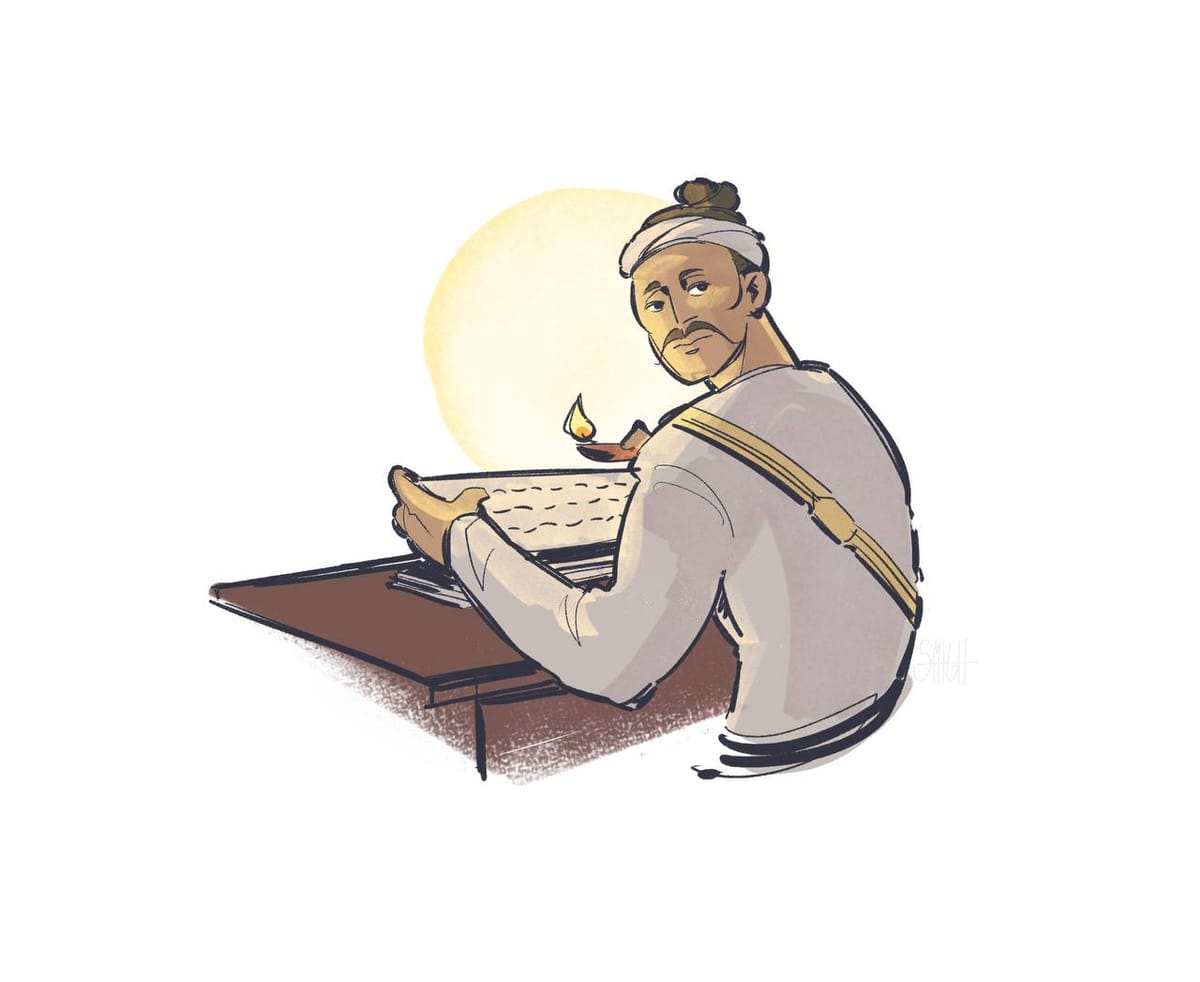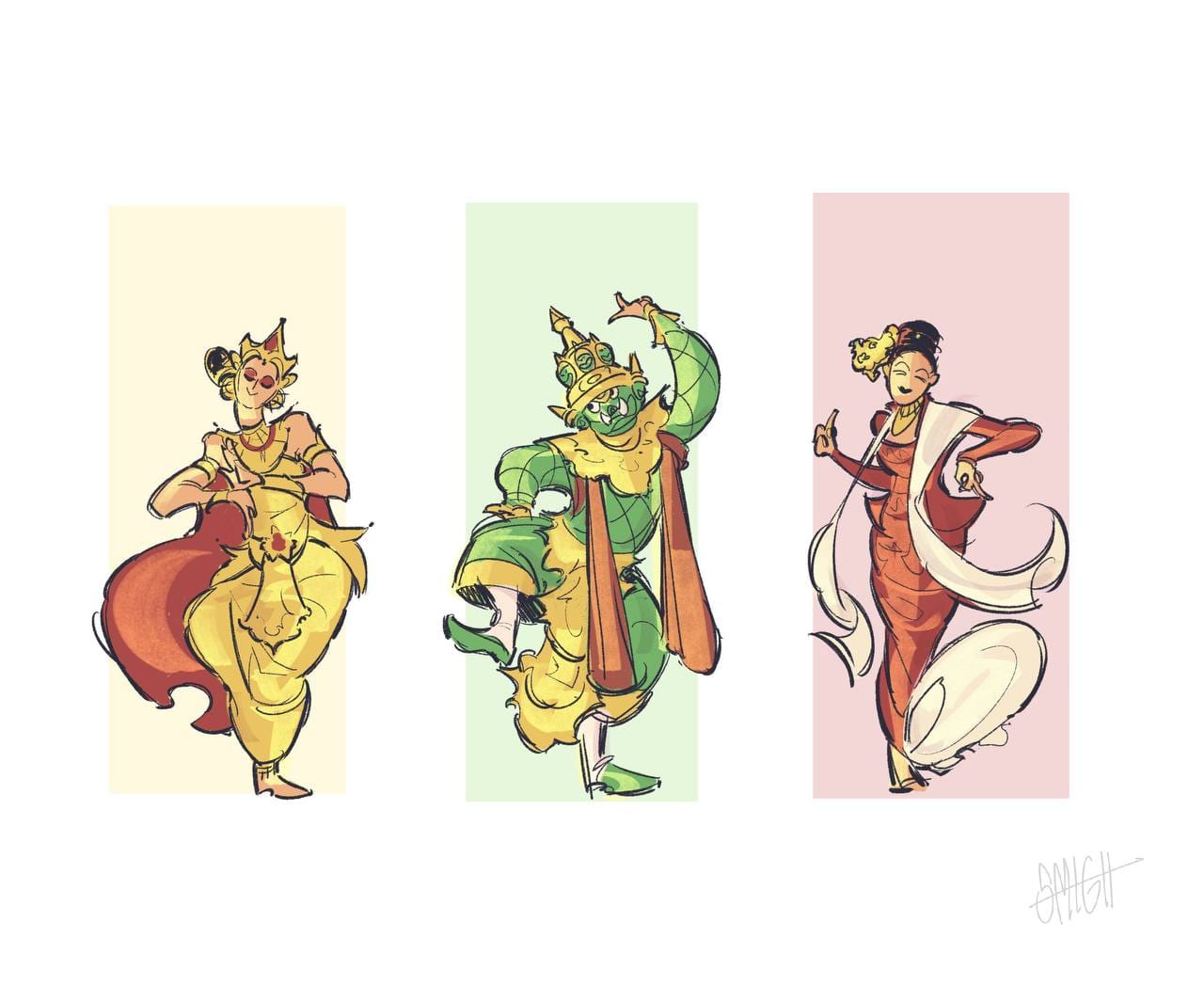
U Boe Hlaing, the last Yaw Minister of the Konbaung Dynasty, contributed a significant treatise to Myanmar's history. This work is known as the Rajadhammasangaha.
Pagan Wunhtauk Minister U Tin describes this text as "a treatise to counsel King Thibaw." Some scholars refer to it as a work attempting to reform the absolute monarchy system and initiate a new administrative system. Notably, historian Dr. Than Tun even suggests that this text advocates for Constitutional Monarchy.
Famous writer Maung Htin states that the Rajadhammasangaha is "a revolutionary text that challenges old Myanmar political thoughts." Contemporary renowned writer Kyaw Win describes it as "the first political economy treatise compiled by a Myanmar scholar attempting to transform the entire Myanmar socio-economic life."
U Boe Hlaing himself modestly describes his Rajadhammasangaha as "a treatise to be practiced by rulers and high officials." In the context of absolute monarchy, it wasn't possible to directly state that this was a text meant to counsel the king or to enforce legal boundaries on the monarchy for governing people according to law. During the absolute monarchy era, no matter how excellent a treatise might be, speaking inappropriately could result in execution.
So, what exactly is this Rajadhammasangaha that scholars reference? What makes it distinctive, and what impact did it have? Moreover, how does it relate to Myanmar's democracy?
Social Contract
What is a social contract? In its simplest definition, a social contract is an agreement between rulers and the ruled. It can be understood as a mutual commitment defining how rulers and subjects should behave. This is essentially the concept of constitution, which is a component of today's democracy.
David Hume in 1748, Rousseau in 1776, and John Locke in 1960 progressively developed the concept of Social Contract.
U Boe Hlaing also presented this social contract theory in the Rajadhammasangaha:
"When we, the people, have disputes among ourselves, there is no one to judge and decide. You should not engage in farming and trade. From the wealth we gain through our trade and work, we will provide enough for you to sustain yourself like us, and thus we crown the Buddha-to-be who possesses the wisdom and characteristics to protect the country."
This passage demonstrates the existence of mutual agreements between the prospective king and the subjects to be ruled. The basic concept that subjects would pay taxes while the ruling king would govern justly and protect them constitutes a social contract.
This fundamental concept is the same as today's Constitutional principles. The constitution also contains mutual commitments about the duties and rights of ruling presidents and prime ministers, the duties and rights of the ruled, how the country will be governed, and what economic system will be practiced.
U Boe Hlaing's Democracy
At the very beginning of the Rajadhammasangaha, it states: "If a country is ruled by the authority of one or two persons alone, being human, they are prone to make mistakes. Therefore, do not act on the authority of one or two persons; when ministers convene and act together, there will be no room for error."
This concept indicates the basic administrative system of how to govern a country. U Boe Hlaing suggests that governing by collective decision is free from error.
Since the term "democracy" had not yet emerged in Myanmar at that time, this term wasn't used. While U Boe Hlaing's system might not exactly match today's democratic principles in detail, the basic concept remains the same: governance by collective will.
When discussing governance by collective opinion, there were the Licchavi kings during the Buddha's time. They are called "kings" because they were a collective rather than individuals. They governed their Licchavi country through rotation and collective leadership.
Referencing the Licchavi kings, the Buddha preached the seven principles of prosperity (Aparihaniyadhamma), which U Boe Hlaing includes in his Rajadhammasangaha:
- Holding regular consultative meetings
- Working in unity
- Following the law
- Respecting elders' guidance
- Not oppressing women
- Paying homage to city and village guardian spirits
- Protecting the arahants
Among these seven principles, four points – holding consultative meetings, working in unity, following the law, and not oppressing women – embody democratic principles.
When governing by collective will, law is crucial. He further explains how laws should be enacted.
British Parliamentary System and Media
Minister Kinwun U Kaung, sent as an ambassador by King Mindon, visited Britain and France. Upon return, he wrote daily records of his London and Paris visits. While U Boe Hlaing never traveled abroad, he included in his treatise the British parliamentary system that Minister Kinwun had studied firsthand:
"In the British Parliament, there are two legislative chambers: one group of elders approved by towns and villages within the country, and another group of nobles who come by hereditary succession. They must work to achieve harmony according to the principle of non-conflict and properly implement the four principles of social welfare."
"A group of elders approved by towns and villages within the country" would be equivalent to today's Lower House, while "nobles who come by hereditary succession" would be more similar to today's Upper House.
"During the period when these two legislative chambers – the group of elders and the hereditary noble group – negotiate and discuss, journalists are allowed to listen and publish daily news to the country. The country's people also respond through newspapers whether they approve or disapprove, and negotiations continue." This indicates that parliamentary discussions should be disseminated to the public through newspapers.
Newspapers had existed in the royal capital of Mandalay since King Mindon's time (Myanmar Era 1230), and U Boe Hlaing's Rajadhammasangaha suggests using media's role to oversee parliament.
Economic Circulation Theory and Four Principles of Social Welfare
Writer Kyaw Win notes in one of his books that U Boe Hlaing's presentation of the four principles of social welfare in the Rajadhammasangaha closely resembles the public finance concepts of physiocrat Francois Quesnay.
The four principles of social welfare are:
- Sassamedha - Taxation (collecting taxes from merchants and farmers)
- Purisamedha - Distribution (providing for those who protect tax collection)
- Sammapasa - Protection (nurturing merchants and farmers to prosper)
- Vacapeyya - Fair Treatment (treating merchants and farmers justly and kindly)
Let's interpret these four principles in modern terms.
Sassamedha means tax collection. In that era, since merchants and farmers were the majority, it meant collecting taxes from them.
Purisamedha refers to providing compensation (salary) to those who collect and maintain taxes. In modern terms, this would be like paying salaries to government employees, including armed forces.
Sammapasa means devising ways to help merchants and farmers prosper and taking action for their development. In modern terms, this might include providing legal protection, necessary support, and protection from thieves and robbers. Such protection enables merchants and farmers to prosper, generating more tax revenue, which in turn allows for more national development.
Vacapeyya means that since merchants and farmers are taxpayers, tax collectors should treat them with kindness and courtesy.
When summarizing the four principles of social welfare, we find concepts of income circulation: collect taxes, pay public servants, protect taxpayers to prosper, and treat taxpayers cordially.
The Nature of Taxes According to the Text
"Kings, ministers, and armed forces who collect and use taxes must certainly protect merchants and farmers so they can trade and work without threats."
"Rulers and ministers governing the country must constantly observe and encourage merchants and farmers. Such encouragement itself constitutes developing the country and nation."
In the Rajadhammasangaha, U Boe Hlaing repeatedly emphasizes the protection of taxpayers who are the backbone of public finance.
Moreover, it's surprising to find a warning in the text suggesting that tax revenue in the absolute monarchy era is public finance, not king's property:
"If merchants and farmers are not protected, and if [tax revenue] is donated and spent as desired, it is no different from the 25 types of theft, including 'kutevahara' (taking by deception) and 'pasayhavahara' (taking by oppression)..."
In summary, this suggests that using tax revenue from merchants and farmers as personal property is equivalent to theft by deception and oppression. It can also be seen as a prohibition against arbitrary spending of public funds.
Furthermore, the text suggests establishing a treasury system (equivalent to today's Central Bank concept) and even paying salary to the king. This led U Boe Hlaing to face opposition from King Thibaw's chief queen.
The Laws of Capitalist Era
In the past, wars during the absolute monarchy era were wars of glory and power. They could be called wars of anger. Wars could break out over minor issues like a vassal state not presenting a white elephant or not paying homage. Later modern wars, however, became wars of greed rather than such reasons.
As capitalism flourished, warfare became about economic interests. Particularly, the Dutch, Portuguese, and British had been colonizing around the world for trade since the early 19th century. U Boe Hlaing was aware of this and thus warned in the Rajadhammasangaha:
"Among the Western races, most wars occur due to supporting merchants and removing obstacles to increasing the principle of sammapasa (protection and development)."
Looking at contemporary wars, one could say they are all fought for economic interests. Russia's invasion of Ukraine is for its interests, just as the China-US trade war is about economic interests. Thus, U Boe Hlaing noted in the Rajadhammasangaha hundreds of years ago that wars of greed increased along with the growth of capitalism.
The Fall of Early Democracy
When writing the Rajadhammasangaha, U Boe Hlaing interpreted Western political and economic systems through a Myanmar perspective, making them comprehensible to Myanmar people using Myanmar principles. Despite being in an era dominated by racial and national pride, he included the strengths of Western nations in his text.
U Boe Hlaing's proposals are the same basic principles practiced in today's international community. He included these matters in his text about 150 years ago. However, his concepts were about 140 years too early for Myanmar. Therefore, the absolute monarchy circle in which he moved did not accept his concepts. They clung to power and couldn't relinquish their authority.
The group that shared U Boe Hlaing's ideology consisted of Crown Prince Kanaung and Minister Kinwun U Kaung. These three together planned to initiate constitutional monarchy, develop military strength, and establish an industrialized state. However, after Crown Prince Kanaung's assassination, all their aspirations became distant. Thus, the Rajadhammasangaha, which emerged after Crown Prince Kanaung's death, remained just a text.
In other words, Myanmar's early democratic principles remained only in the book. Today, the palm-leaf manuscript of U Boe Hlaing's Rajadhammasangaha, which indicates Myanmar's early democracy, resides in the National Museum.
The democratic principles to be followed from the text haven't reached practical ground even today. This is why Myanmar has lagged behind others for many years. Now, Myanmar's deviation from democracy has lasted more than 140 years.
If only they had considered following U Boe Hlaing's text back then, it's worth contemplating how Myanmar's politics might have transformed differently.
Linn Theim (Y3A)
R
 Build Myanmar - MediaY3A
Build Myanmar - MediaY3A
 Build Myanmar - MediaY3A
Build Myanmar - MediaY3A
Build Myanmar-Media : Insights | Empowering Myanmar Youth, Culture, and Innovation
Build Myanmar-Media Insights brings you in-depth articles that cover the intersection of Myanmar’s rich culture, youth empowerment, and the latest developments in technology and business.
Sign up for Build Myanmar - Media
Myanmar's leading Media Brand focusing on rebuilding Myanmar. We cover emerging tech, youth development and market insights.
No spam. Unsubscribe anytime.
Sign up now to get the latest insights directly to your mailbox from the Myanmar's No.1 Tech and Business media source.
📅 New content every week, featuring stories that connect Myanmar’s heritage with its future.
📰 Explore more:
- Website: https://www.buildmyanmarmedia.com/
- Facebook: https://www.facebook.com/buildmyanmar
- YouTube: https://youtube.com/@buildmyanmarmedia
- Telegram: https://t.me/+6_0G6CLwrwMwZTIx
- Inquiry: info@buildmyanmar.org
#BuildMyanmarNews #DailyNewsMyanmar #MyanmarUpdates #MyanmarNews #BuildMyanmarMedia #Myanmarliterature #myanmararticle #Updates #Insights #Media
